Auditing Theory and Practice: Threats to Auditor Independence
VerifiedAdded on 2020/05/16
|9
|2191
|328
Report
AI Summary
This report critically evaluates auditor independence and objectivity in relation to audit quality. It explores the issues surrounding ISA 200, professional skepticism, and the factors affecting audit quality, such as industry expertise, audit tenure, and audit fees. The report highlights the benefits of engagement quality control reviews in improving audit quality and analyzes potential threats to auditor independence, including self-review, self-interest, and intimidation threats. The report uses the British Telecom accounting irregularities case as an example to illustrate these threats. The conclusion emphasizes the importance of auditor independence in maintaining the credibility of financial information and the impact of various factors on audit quality. The report also provides an overview of the factors affecting audit quality, including industry expertise, audit tenure, size of auditors, audit fees, and auditor reputation, and their impact on audit quality. References are included to support the analysis.
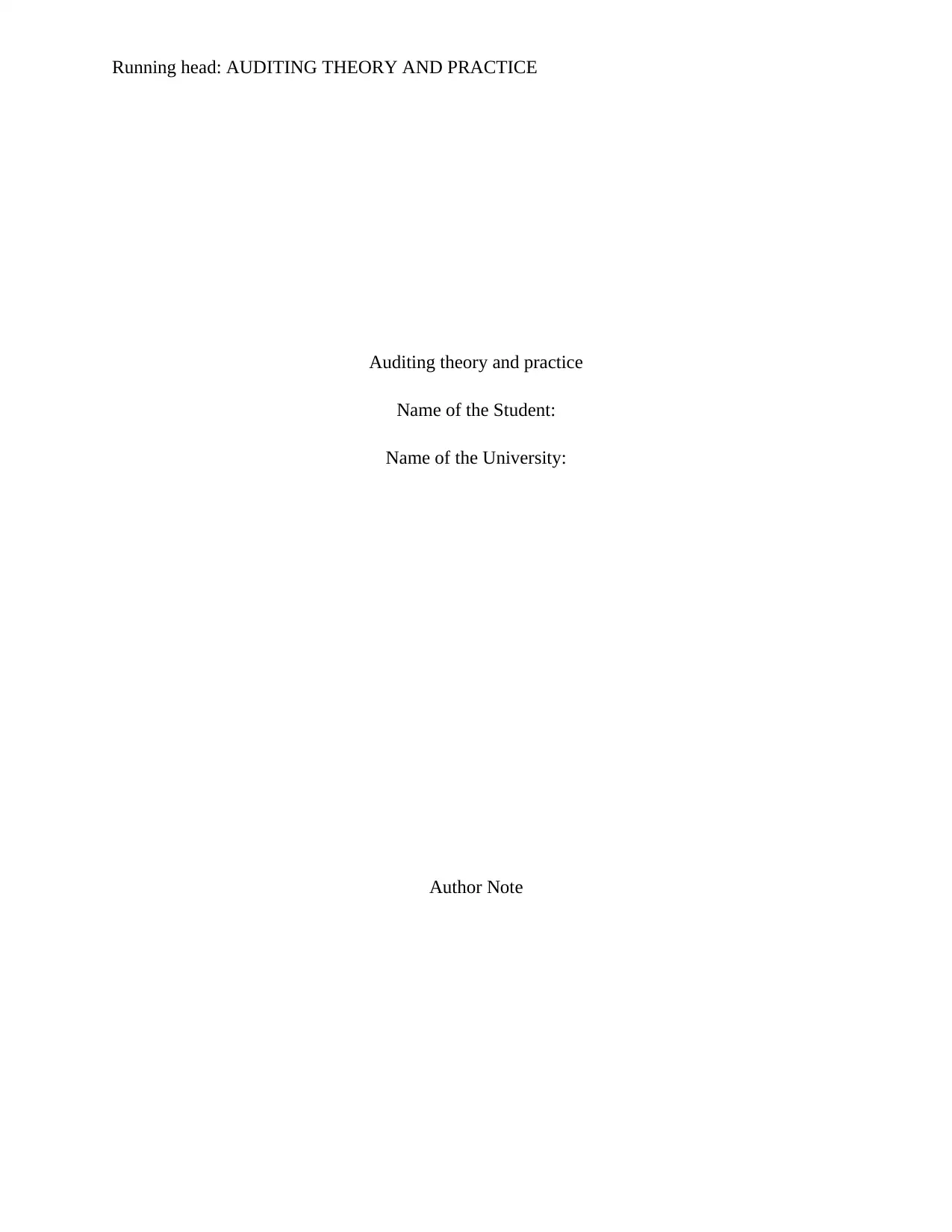
Running head: AUDITING THEORY AND PRACTICE
Auditing theory and practice
Name of the Student:
Name of the University:
Author Note
Auditing theory and practice
Name of the Student:
Name of the University:
Author Note
Paraphrase This Document
Need a fresh take? Get an instant paraphrase of this document with our AI Paraphraser
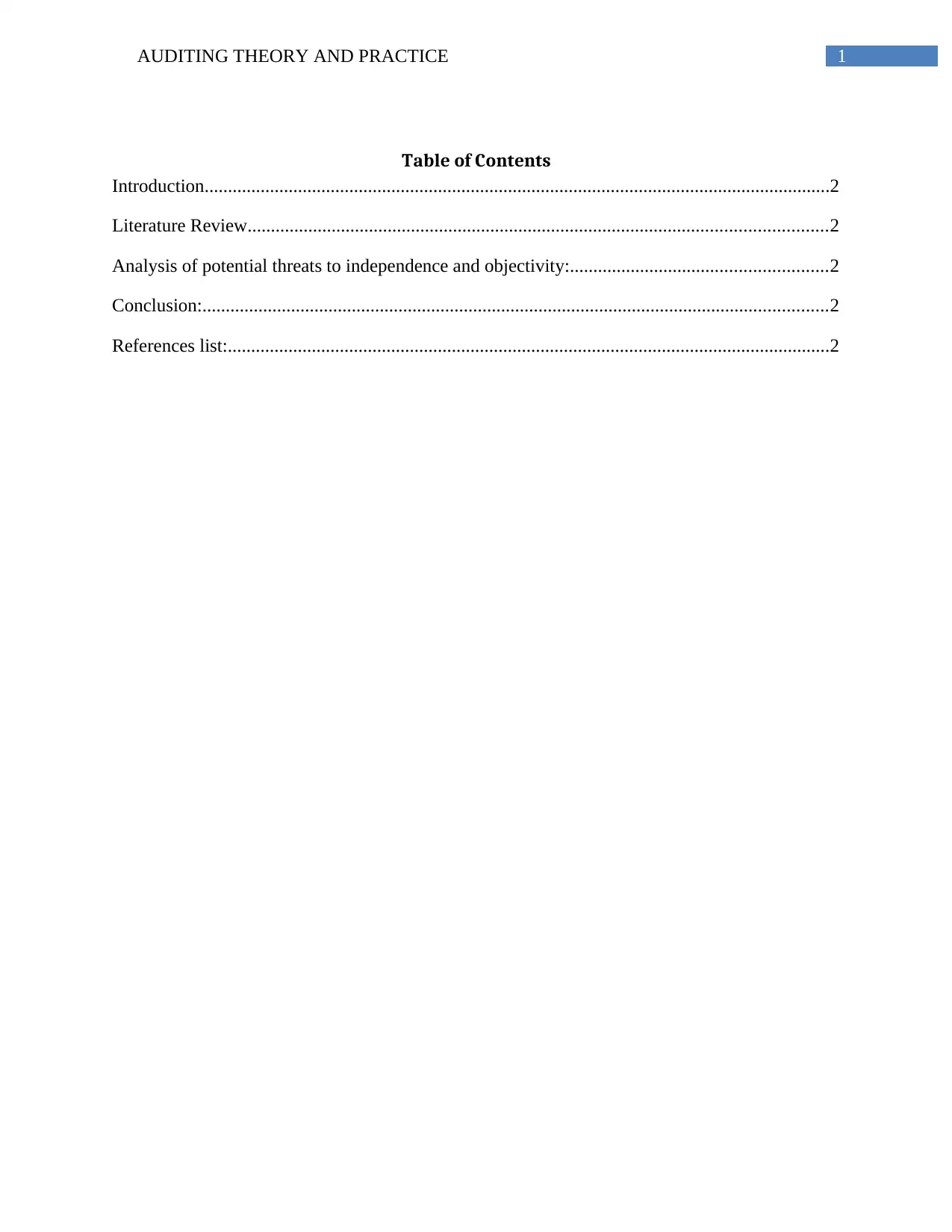
1AUDITING THEORY AND PRACTICE
Table of Contents
Introduction......................................................................................................................................2
Literature Review............................................................................................................................2
Analysis of potential threats to independence and objectivity:.......................................................2
Conclusion:......................................................................................................................................2
References list:.................................................................................................................................2
Table of Contents
Introduction......................................................................................................................................2
Literature Review............................................................................................................................2
Analysis of potential threats to independence and objectivity:.......................................................2
Conclusion:......................................................................................................................................2
References list:.................................................................................................................................2
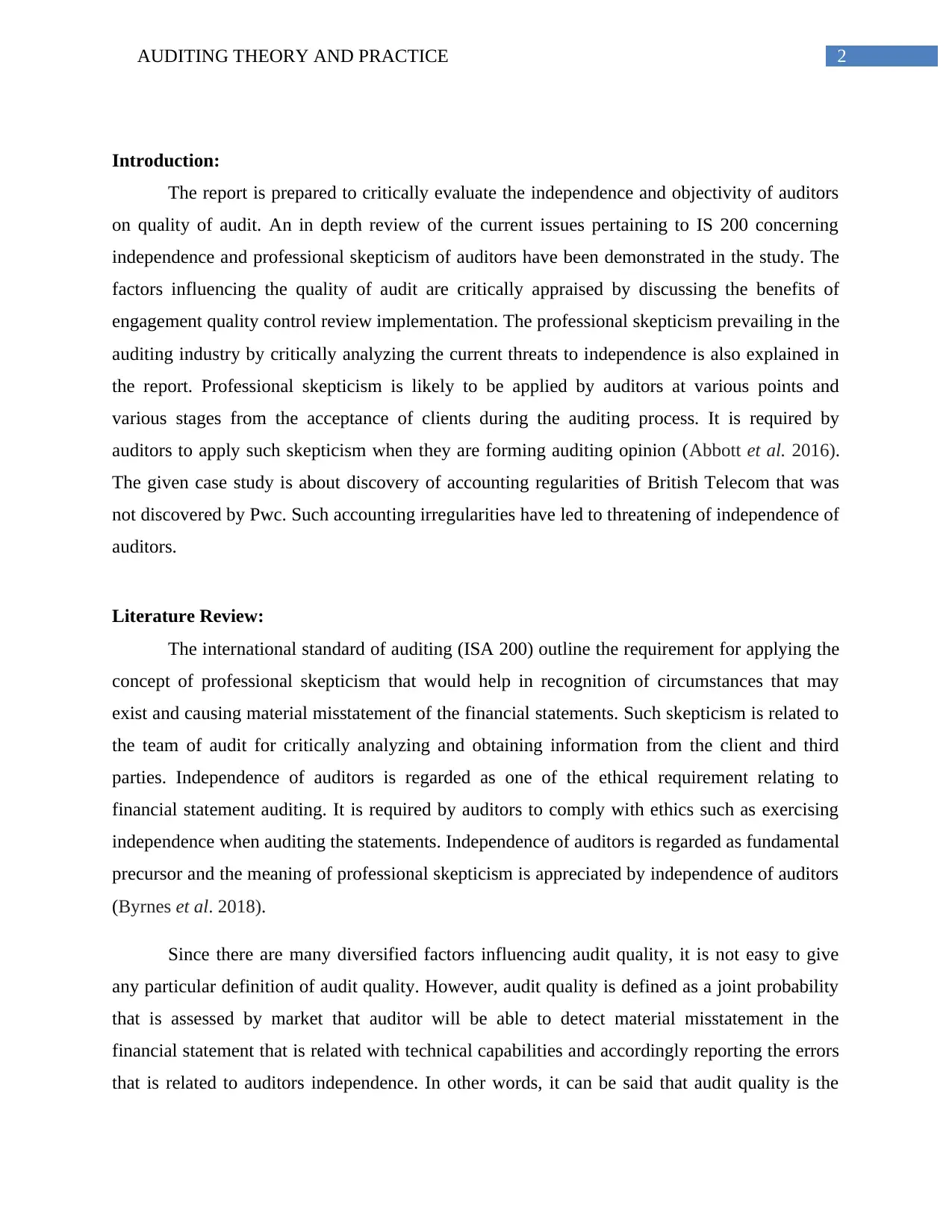
2AUDITING THEORY AND PRACTICE
Introduction:
The report is prepared to critically evaluate the independence and objectivity of auditors
on quality of audit. An in depth review of the current issues pertaining to IS 200 concerning
independence and professional skepticism of auditors have been demonstrated in the study. The
factors influencing the quality of audit are critically appraised by discussing the benefits of
engagement quality control review implementation. The professional skepticism prevailing in the
auditing industry by critically analyzing the current threats to independence is also explained in
the report. Professional skepticism is likely to be applied by auditors at various points and
various stages from the acceptance of clients during the auditing process. It is required by
auditors to apply such skepticism when they are forming auditing opinion (Abbott et al. 2016).
The given case study is about discovery of accounting regularities of British Telecom that was
not discovered by Pwc. Such accounting irregularities have led to threatening of independence of
auditors.
Literature Review:
The international standard of auditing (ISA 200) outline the requirement for applying the
concept of professional skepticism that would help in recognition of circumstances that may
exist and causing material misstatement of the financial statements. Such skepticism is related to
the team of audit for critically analyzing and obtaining information from the client and third
parties. Independence of auditors is regarded as one of the ethical requirement relating to
financial statement auditing. It is required by auditors to comply with ethics such as exercising
independence when auditing the statements. Independence of auditors is regarded as fundamental
precursor and the meaning of professional skepticism is appreciated by independence of auditors
(Byrnes et al. 2018).
Since there are many diversified factors influencing audit quality, it is not easy to give
any particular definition of audit quality. However, audit quality is defined as a joint probability
that is assessed by market that auditor will be able to detect material misstatement in the
financial statement that is related with technical capabilities and accordingly reporting the errors
that is related to auditors independence. In other words, it can be said that audit quality is the
Introduction:
The report is prepared to critically evaluate the independence and objectivity of auditors
on quality of audit. An in depth review of the current issues pertaining to IS 200 concerning
independence and professional skepticism of auditors have been demonstrated in the study. The
factors influencing the quality of audit are critically appraised by discussing the benefits of
engagement quality control review implementation. The professional skepticism prevailing in the
auditing industry by critically analyzing the current threats to independence is also explained in
the report. Professional skepticism is likely to be applied by auditors at various points and
various stages from the acceptance of clients during the auditing process. It is required by
auditors to apply such skepticism when they are forming auditing opinion (Abbott et al. 2016).
The given case study is about discovery of accounting regularities of British Telecom that was
not discovered by Pwc. Such accounting irregularities have led to threatening of independence of
auditors.
Literature Review:
The international standard of auditing (ISA 200) outline the requirement for applying the
concept of professional skepticism that would help in recognition of circumstances that may
exist and causing material misstatement of the financial statements. Such skepticism is related to
the team of audit for critically analyzing and obtaining information from the client and third
parties. Independence of auditors is regarded as one of the ethical requirement relating to
financial statement auditing. It is required by auditors to comply with ethics such as exercising
independence when auditing the statements. Independence of auditors is regarded as fundamental
precursor and the meaning of professional skepticism is appreciated by independence of auditors
(Byrnes et al. 2018).
Since there are many diversified factors influencing audit quality, it is not easy to give
any particular definition of audit quality. However, audit quality is defined as a joint probability
that is assessed by market that auditor will be able to detect material misstatement in the
financial statement that is related with technical capabilities and accordingly reporting the errors
that is related to auditors independence. In other words, it can be said that audit quality is the
⊘ This is a preview!⊘
Do you want full access?
Subscribe today to unlock all pages.

Trusted by 1+ million students worldwide
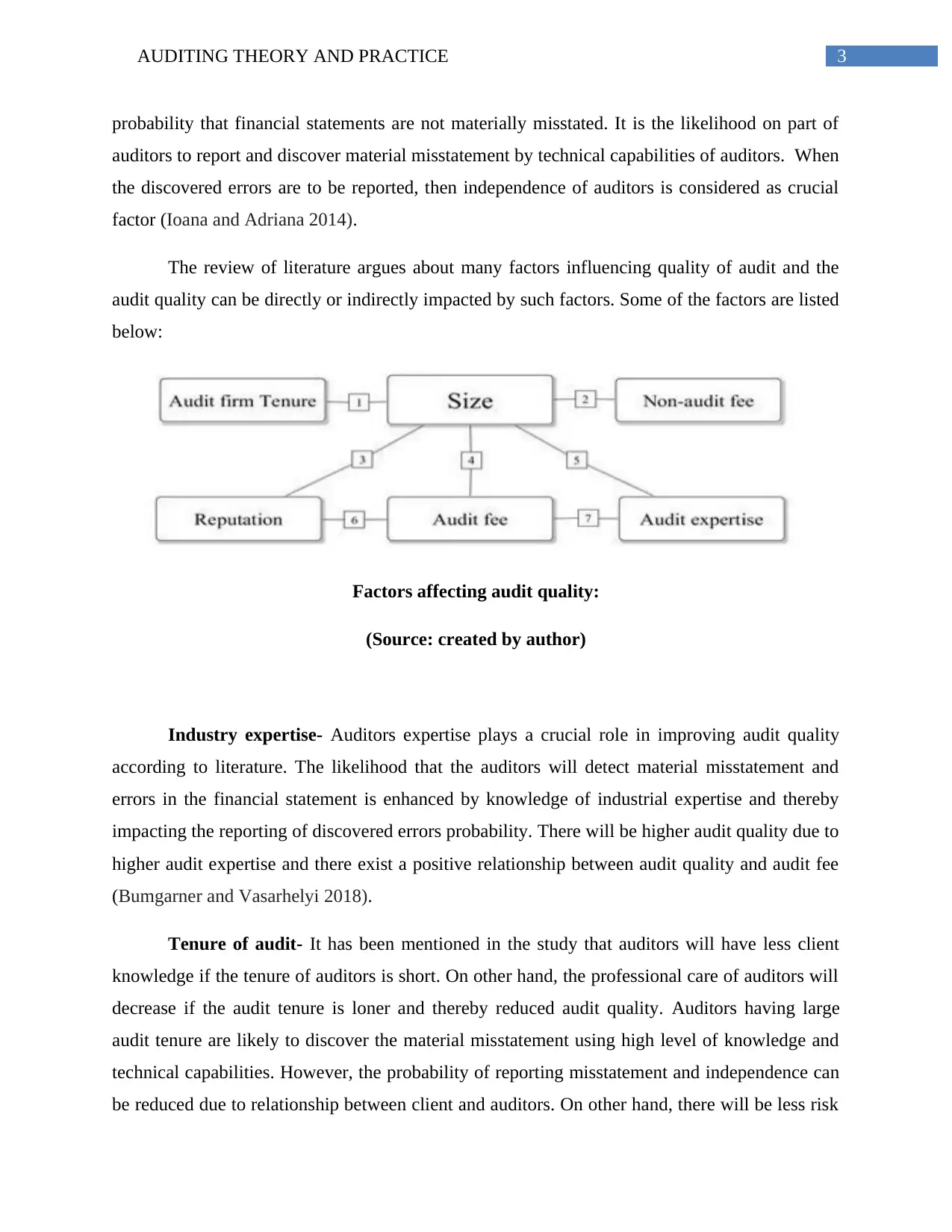
3AUDITING THEORY AND PRACTICE
probability that financial statements are not materially misstated. It is the likelihood on part of
auditors to report and discover material misstatement by technical capabilities of auditors. When
the discovered errors are to be reported, then independence of auditors is considered as crucial
factor (Ioana and Adriana 2014).
The review of literature argues about many factors influencing quality of audit and the
audit quality can be directly or indirectly impacted by such factors. Some of the factors are listed
below:
Factors affecting audit quality:
(Source: created by author)
Industry expertise- Auditors expertise plays a crucial role in improving audit quality
according to literature. The likelihood that the auditors will detect material misstatement and
errors in the financial statement is enhanced by knowledge of industrial expertise and thereby
impacting the reporting of discovered errors probability. There will be higher audit quality due to
higher audit expertise and there exist a positive relationship between audit quality and audit fee
(Bumgarner and Vasarhelyi 2018).
Tenure of audit- It has been mentioned in the study that auditors will have less client
knowledge if the tenure of auditors is short. On other hand, the professional care of auditors will
decrease if the audit tenure is loner and thereby reduced audit quality. Auditors having large
audit tenure are likely to discover the material misstatement using high level of knowledge and
technical capabilities. However, the probability of reporting misstatement and independence can
be reduced due to relationship between client and auditors. On other hand, there will be less risk
probability that financial statements are not materially misstated. It is the likelihood on part of
auditors to report and discover material misstatement by technical capabilities of auditors. When
the discovered errors are to be reported, then independence of auditors is considered as crucial
factor (Ioana and Adriana 2014).
The review of literature argues about many factors influencing quality of audit and the
audit quality can be directly or indirectly impacted by such factors. Some of the factors are listed
below:
Factors affecting audit quality:
(Source: created by author)
Industry expertise- Auditors expertise plays a crucial role in improving audit quality
according to literature. The likelihood that the auditors will detect material misstatement and
errors in the financial statement is enhanced by knowledge of industrial expertise and thereby
impacting the reporting of discovered errors probability. There will be higher audit quality due to
higher audit expertise and there exist a positive relationship between audit quality and audit fee
(Bumgarner and Vasarhelyi 2018).
Tenure of audit- It has been mentioned in the study that auditors will have less client
knowledge if the tenure of auditors is short. On other hand, the professional care of auditors will
decrease if the audit tenure is loner and thereby reduced audit quality. Auditors having large
audit tenure are likely to discover the material misstatement using high level of knowledge and
technical capabilities. However, the probability of reporting misstatement and independence can
be reduced due to relationship between client and auditors. On other hand, there will be less risk
Paraphrase This Document
Need a fresh take? Get an instant paraphrase of this document with our AI Paraphraser
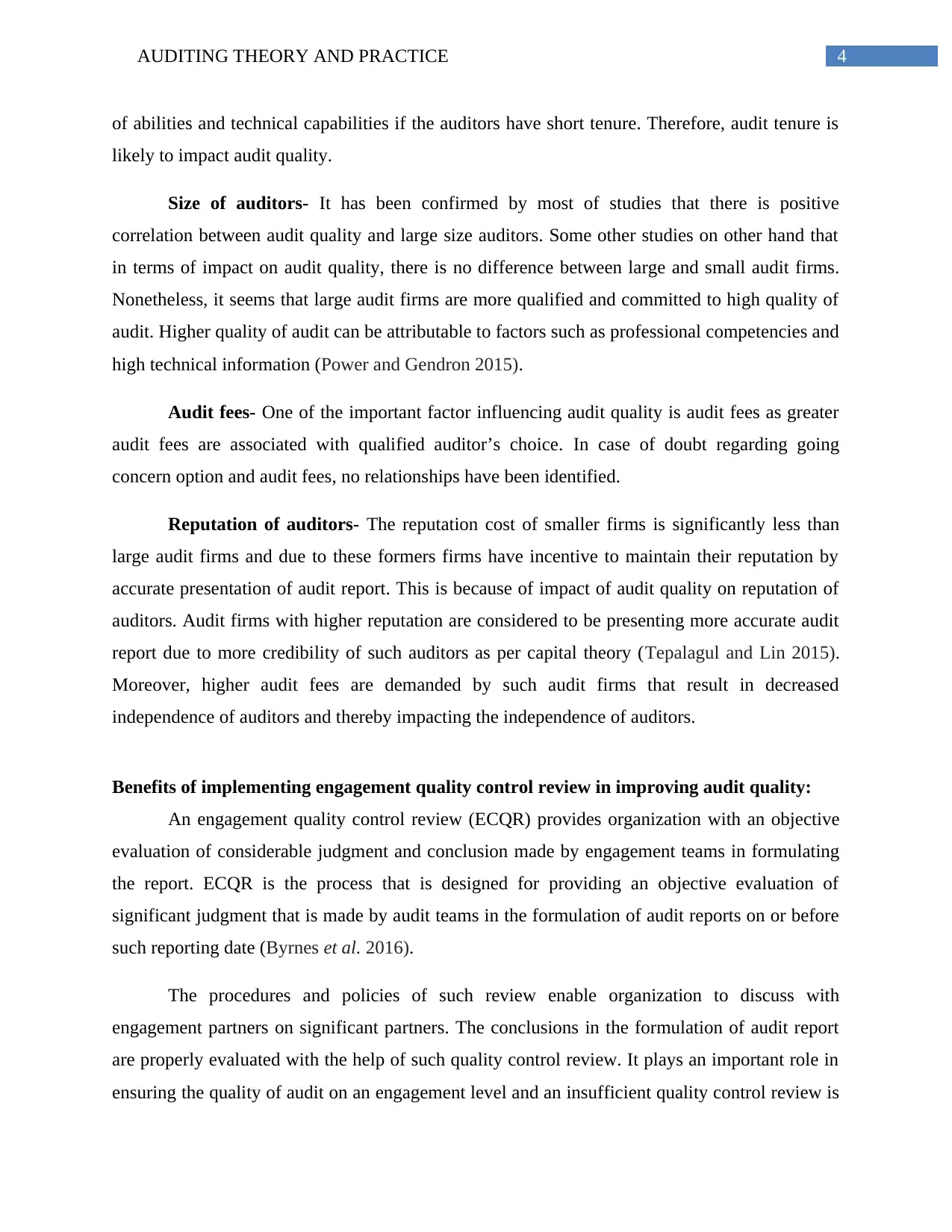
4AUDITING THEORY AND PRACTICE
of abilities and technical capabilities if the auditors have short tenure. Therefore, audit tenure is
likely to impact audit quality.
Size of auditors- It has been confirmed by most of studies that there is positive
correlation between audit quality and large size auditors. Some other studies on other hand that
in terms of impact on audit quality, there is no difference between large and small audit firms.
Nonetheless, it seems that large audit firms are more qualified and committed to high quality of
audit. Higher quality of audit can be attributable to factors such as professional competencies and
high technical information (Power and Gendron 2015).
Audit fees- One of the important factor influencing audit quality is audit fees as greater
audit fees are associated with qualified auditor’s choice. In case of doubt regarding going
concern option and audit fees, no relationships have been identified.
Reputation of auditors- The reputation cost of smaller firms is significantly less than
large audit firms and due to these formers firms have incentive to maintain their reputation by
accurate presentation of audit report. This is because of impact of audit quality on reputation of
auditors. Audit firms with higher reputation are considered to be presenting more accurate audit
report due to more credibility of such auditors as per capital theory (Tepalagul and Lin 2015).
Moreover, higher audit fees are demanded by such audit firms that result in decreased
independence of auditors and thereby impacting the independence of auditors.
Benefits of implementing engagement quality control review in improving audit quality:
An engagement quality control review (ECQR) provides organization with an objective
evaluation of considerable judgment and conclusion made by engagement teams in formulating
the report. ECQR is the process that is designed for providing an objective evaluation of
significant judgment that is made by audit teams in the formulation of audit reports on or before
such reporting date (Byrnes et al. 2016).
The procedures and policies of such review enable organization to discuss with
engagement partners on significant partners. The conclusions in the formulation of audit report
are properly evaluated with the help of such quality control review. It plays an important role in
ensuring the quality of audit on an engagement level and an insufficient quality control review is
of abilities and technical capabilities if the auditors have short tenure. Therefore, audit tenure is
likely to impact audit quality.
Size of auditors- It has been confirmed by most of studies that there is positive
correlation between audit quality and large size auditors. Some other studies on other hand that
in terms of impact on audit quality, there is no difference between large and small audit firms.
Nonetheless, it seems that large audit firms are more qualified and committed to high quality of
audit. Higher quality of audit can be attributable to factors such as professional competencies and
high technical information (Power and Gendron 2015).
Audit fees- One of the important factor influencing audit quality is audit fees as greater
audit fees are associated with qualified auditor’s choice. In case of doubt regarding going
concern option and audit fees, no relationships have been identified.
Reputation of auditors- The reputation cost of smaller firms is significantly less than
large audit firms and due to these formers firms have incentive to maintain their reputation by
accurate presentation of audit report. This is because of impact of audit quality on reputation of
auditors. Audit firms with higher reputation are considered to be presenting more accurate audit
report due to more credibility of such auditors as per capital theory (Tepalagul and Lin 2015).
Moreover, higher audit fees are demanded by such audit firms that result in decreased
independence of auditors and thereby impacting the independence of auditors.
Benefits of implementing engagement quality control review in improving audit quality:
An engagement quality control review (ECQR) provides organization with an objective
evaluation of considerable judgment and conclusion made by engagement teams in formulating
the report. ECQR is the process that is designed for providing an objective evaluation of
significant judgment that is made by audit teams in the formulation of audit reports on or before
such reporting date (Byrnes et al. 2016).
The procedures and policies of such review enable organization to discuss with
engagement partners on significant partners. The conclusions in the formulation of audit report
are properly evaluated with the help of such quality control review. It plays an important role in
ensuring the quality of audit on an engagement level and an insufficient quality control review is
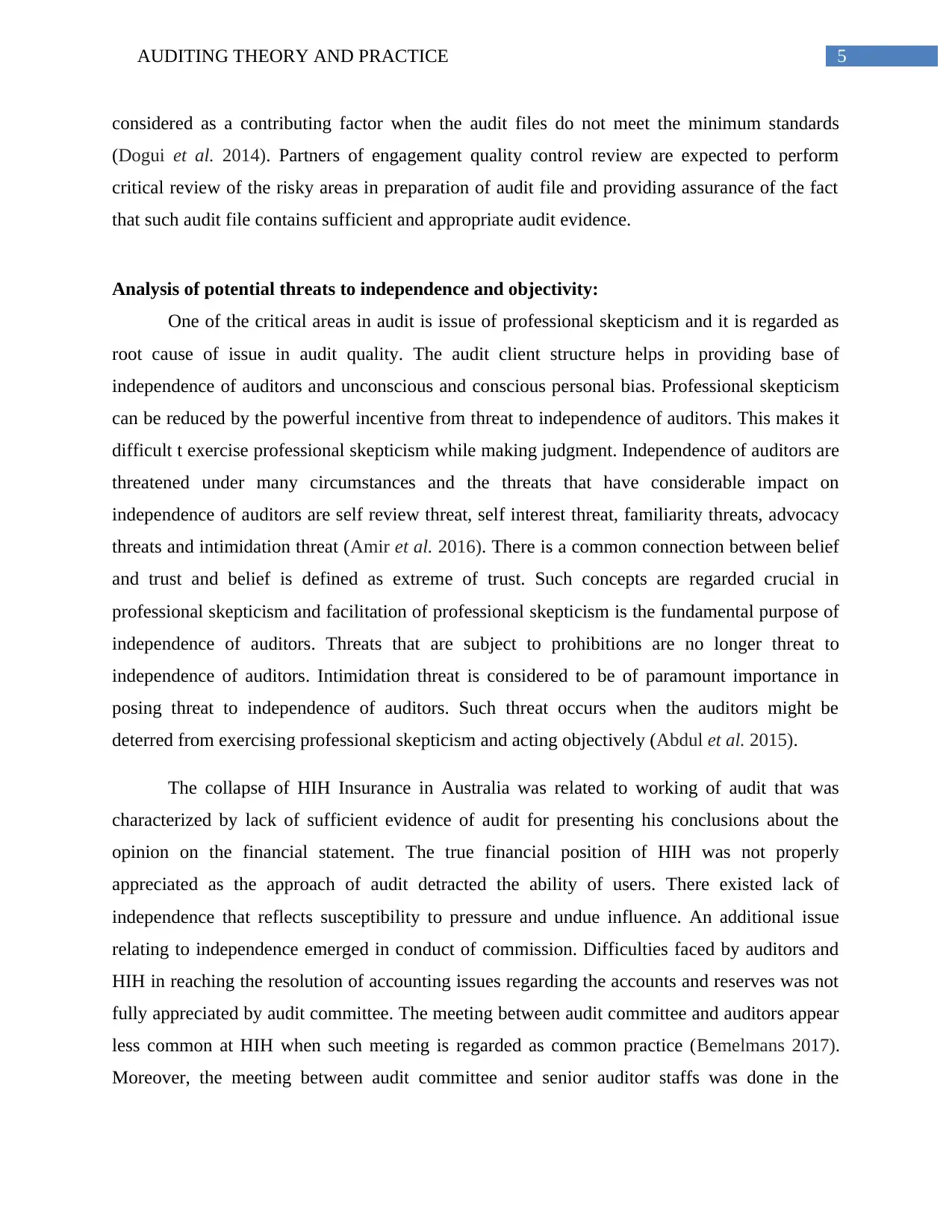
5AUDITING THEORY AND PRACTICE
considered as a contributing factor when the audit files do not meet the minimum standards
(Dogui et al. 2014). Partners of engagement quality control review are expected to perform
critical review of the risky areas in preparation of audit file and providing assurance of the fact
that such audit file contains sufficient and appropriate audit evidence.
Analysis of potential threats to independence and objectivity:
One of the critical areas in audit is issue of professional skepticism and it is regarded as
root cause of issue in audit quality. The audit client structure helps in providing base of
independence of auditors and unconscious and conscious personal bias. Professional skepticism
can be reduced by the powerful incentive from threat to independence of auditors. This makes it
difficult t exercise professional skepticism while making judgment. Independence of auditors are
threatened under many circumstances and the threats that have considerable impact on
independence of auditors are self review threat, self interest threat, familiarity threats, advocacy
threats and intimidation threat (Amir et al. 2016). There is a common connection between belief
and trust and belief is defined as extreme of trust. Such concepts are regarded crucial in
professional skepticism and facilitation of professional skepticism is the fundamental purpose of
independence of auditors. Threats that are subject to prohibitions are no longer threat to
independence of auditors. Intimidation threat is considered to be of paramount importance in
posing threat to independence of auditors. Such threat occurs when the auditors might be
deterred from exercising professional skepticism and acting objectively (Abdul et al. 2015).
The collapse of HIH Insurance in Australia was related to working of audit that was
characterized by lack of sufficient evidence of audit for presenting his conclusions about the
opinion on the financial statement. The true financial position of HIH was not properly
appreciated as the approach of audit detracted the ability of users. There existed lack of
independence that reflects susceptibility to pressure and undue influence. An additional issue
relating to independence emerged in conduct of commission. Difficulties faced by auditors and
HIH in reaching the resolution of accounting issues regarding the accounts and reserves was not
fully appreciated by audit committee. The meeting between audit committee and auditors appear
less common at HIH when such meeting is regarded as common practice (Bemelmans 2017).
Moreover, the meeting between audit committee and senior auditor staffs was done in the
considered as a contributing factor when the audit files do not meet the minimum standards
(Dogui et al. 2014). Partners of engagement quality control review are expected to perform
critical review of the risky areas in preparation of audit file and providing assurance of the fact
that such audit file contains sufficient and appropriate audit evidence.
Analysis of potential threats to independence and objectivity:
One of the critical areas in audit is issue of professional skepticism and it is regarded as
root cause of issue in audit quality. The audit client structure helps in providing base of
independence of auditors and unconscious and conscious personal bias. Professional skepticism
can be reduced by the powerful incentive from threat to independence of auditors. This makes it
difficult t exercise professional skepticism while making judgment. Independence of auditors are
threatened under many circumstances and the threats that have considerable impact on
independence of auditors are self review threat, self interest threat, familiarity threats, advocacy
threats and intimidation threat (Amir et al. 2016). There is a common connection between belief
and trust and belief is defined as extreme of trust. Such concepts are regarded crucial in
professional skepticism and facilitation of professional skepticism is the fundamental purpose of
independence of auditors. Threats that are subject to prohibitions are no longer threat to
independence of auditors. Intimidation threat is considered to be of paramount importance in
posing threat to independence of auditors. Such threat occurs when the auditors might be
deterred from exercising professional skepticism and acting objectively (Abdul et al. 2015).
The collapse of HIH Insurance in Australia was related to working of audit that was
characterized by lack of sufficient evidence of audit for presenting his conclusions about the
opinion on the financial statement. The true financial position of HIH was not properly
appreciated as the approach of audit detracted the ability of users. There existed lack of
independence that reflects susceptibility to pressure and undue influence. An additional issue
relating to independence emerged in conduct of commission. Difficulties faced by auditors and
HIH in reaching the resolution of accounting issues regarding the accounts and reserves was not
fully appreciated by audit committee. The meeting between audit committee and auditors appear
less common at HIH when such meeting is regarded as common practice (Bemelmans 2017).
Moreover, the meeting between audit committee and senior auditor staffs was done in the
⊘ This is a preview!⊘
Do you want full access?
Subscribe today to unlock all pages.

Trusted by 1+ million students worldwide
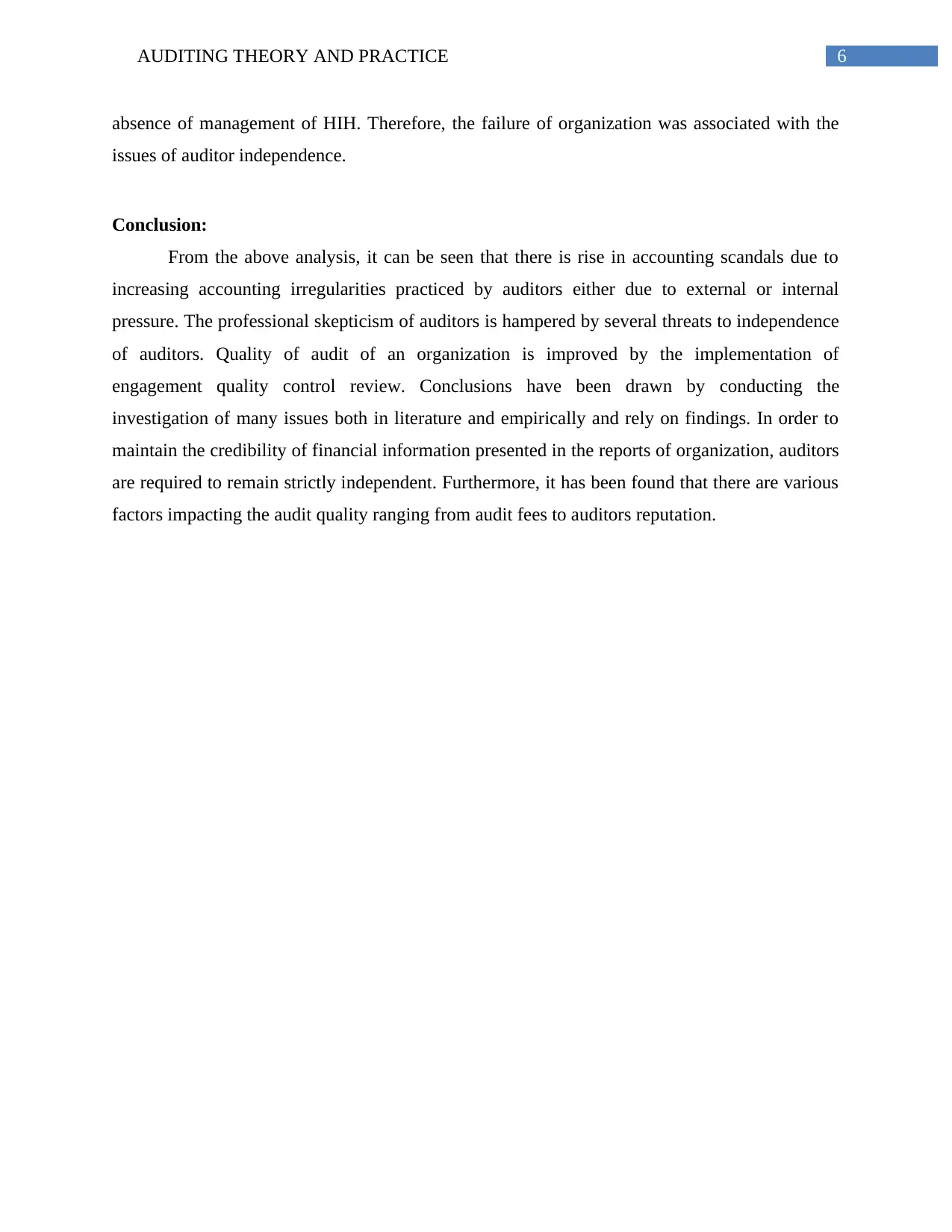
6AUDITING THEORY AND PRACTICE
absence of management of HIH. Therefore, the failure of organization was associated with the
issues of auditor independence.
Conclusion:
From the above analysis, it can be seen that there is rise in accounting scandals due to
increasing accounting irregularities practiced by auditors either due to external or internal
pressure. The professional skepticism of auditors is hampered by several threats to independence
of auditors. Quality of audit of an organization is improved by the implementation of
engagement quality control review. Conclusions have been drawn by conducting the
investigation of many issues both in literature and empirically and rely on findings. In order to
maintain the credibility of financial information presented in the reports of organization, auditors
are required to remain strictly independent. Furthermore, it has been found that there are various
factors impacting the audit quality ranging from audit fees to auditors reputation.
absence of management of HIH. Therefore, the failure of organization was associated with the
issues of auditor independence.
Conclusion:
From the above analysis, it can be seen that there is rise in accounting scandals due to
increasing accounting irregularities practiced by auditors either due to external or internal
pressure. The professional skepticism of auditors is hampered by several threats to independence
of auditors. Quality of audit of an organization is improved by the implementation of
engagement quality control review. Conclusions have been drawn by conducting the
investigation of many issues both in literature and empirically and rely on findings. In order to
maintain the credibility of financial information presented in the reports of organization, auditors
are required to remain strictly independent. Furthermore, it has been found that there are various
factors impacting the audit quality ranging from audit fees to auditors reputation.
Paraphrase This Document
Need a fresh take? Get an instant paraphrase of this document with our AI Paraphraser
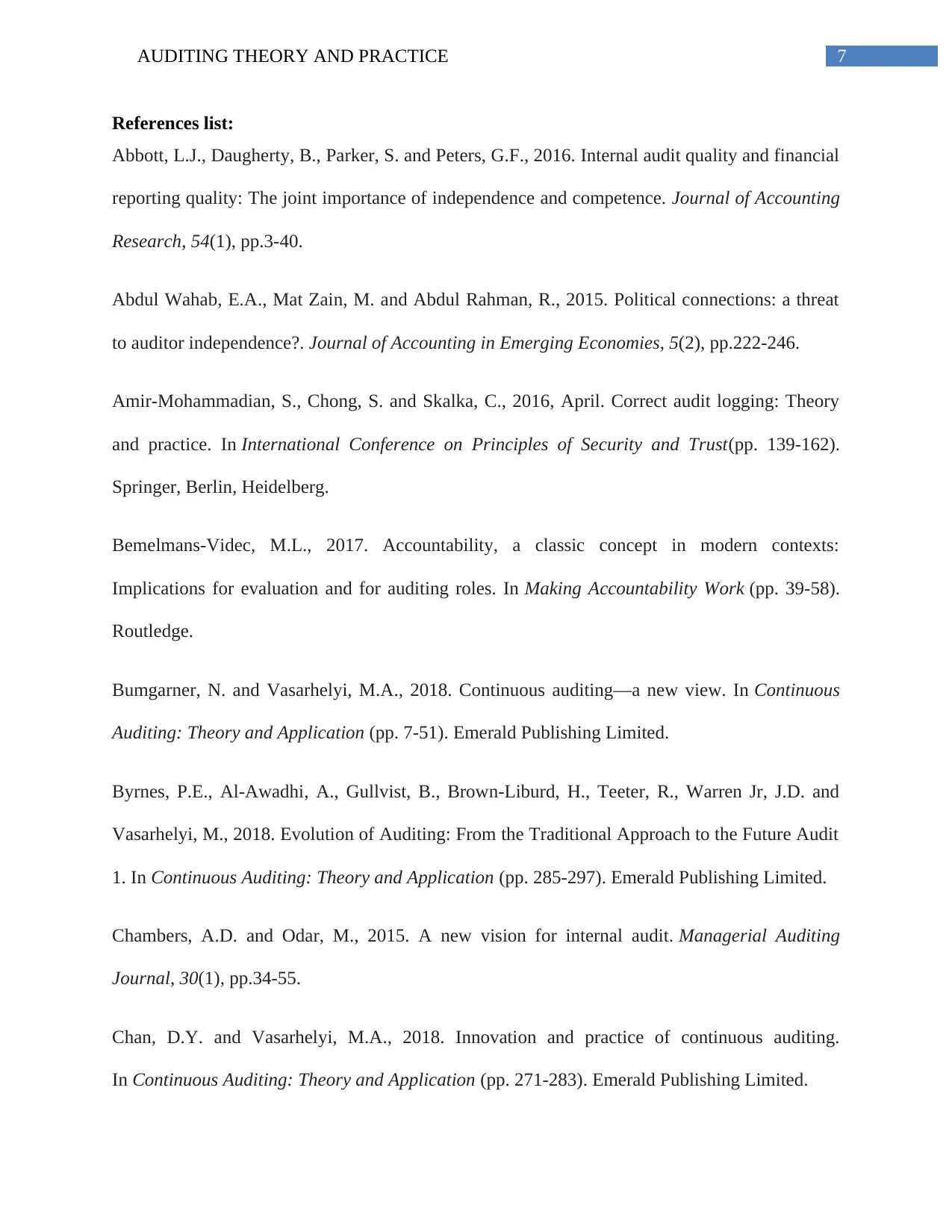
7AUDITING THEORY AND PRACTICE
References list:
Abbott, L.J., Daugherty, B., Parker, S. and Peters, G.F., 2016. Internal audit quality and financial
reporting quality: The joint importance of independence and competence. Journal of Accounting
Research, 54(1), pp.3-40.
Abdul Wahab, E.A., Mat Zain, M. and Abdul Rahman, R., 2015. Political connections: a threat
to auditor independence?. Journal of Accounting in Emerging Economies, 5(2), pp.222-246.
Amir-Mohammadian, S., Chong, S. and Skalka, C., 2016, April. Correct audit logging: Theory
and practice. In International Conference on Principles of Security and Trust(pp. 139-162).
Springer, Berlin, Heidelberg.
Bemelmans-Videc, M.L., 2017. Accountability, a classic concept in modern contexts:
Implications for evaluation and for auditing roles. In Making Accountability Work (pp. 39-58).
Routledge.
Bumgarner, N. and Vasarhelyi, M.A., 2018. Continuous auditing—a new view. In Continuous
Auditing: Theory and Application (pp. 7-51). Emerald Publishing Limited.
Byrnes, P.E., Al-Awadhi, A., Gullvist, B., Brown-Liburd, H., Teeter, R., Warren Jr, J.D. and
Vasarhelyi, M., 2018. Evolution of Auditing: From the Traditional Approach to the Future Audit
1. In Continuous Auditing: Theory and Application (pp. 285-297). Emerald Publishing Limited.
Chambers, A.D. and Odar, M., 2015. A new vision for internal audit. Managerial Auditing
Journal, 30(1), pp.34-55.
Chan, D.Y. and Vasarhelyi, M.A., 2018. Innovation and practice of continuous auditing.
In Continuous Auditing: Theory and Application (pp. 271-283). Emerald Publishing Limited.
References list:
Abbott, L.J., Daugherty, B., Parker, S. and Peters, G.F., 2016. Internal audit quality and financial
reporting quality: The joint importance of independence and competence. Journal of Accounting
Research, 54(1), pp.3-40.
Abdul Wahab, E.A., Mat Zain, M. and Abdul Rahman, R., 2015. Political connections: a threat
to auditor independence?. Journal of Accounting in Emerging Economies, 5(2), pp.222-246.
Amir-Mohammadian, S., Chong, S. and Skalka, C., 2016, April. Correct audit logging: Theory
and practice. In International Conference on Principles of Security and Trust(pp. 139-162).
Springer, Berlin, Heidelberg.
Bemelmans-Videc, M.L., 2017. Accountability, a classic concept in modern contexts:
Implications for evaluation and for auditing roles. In Making Accountability Work (pp. 39-58).
Routledge.
Bumgarner, N. and Vasarhelyi, M.A., 2018. Continuous auditing—a new view. In Continuous
Auditing: Theory and Application (pp. 7-51). Emerald Publishing Limited.
Byrnes, P.E., Al-Awadhi, A., Gullvist, B., Brown-Liburd, H., Teeter, R., Warren Jr, J.D. and
Vasarhelyi, M., 2018. Evolution of Auditing: From the Traditional Approach to the Future Audit
1. In Continuous Auditing: Theory and Application (pp. 285-297). Emerald Publishing Limited.
Chambers, A.D. and Odar, M., 2015. A new vision for internal audit. Managerial Auditing
Journal, 30(1), pp.34-55.
Chan, D.Y. and Vasarhelyi, M.A., 2018. Innovation and practice of continuous auditing.
In Continuous Auditing: Theory and Application (pp. 271-283). Emerald Publishing Limited.
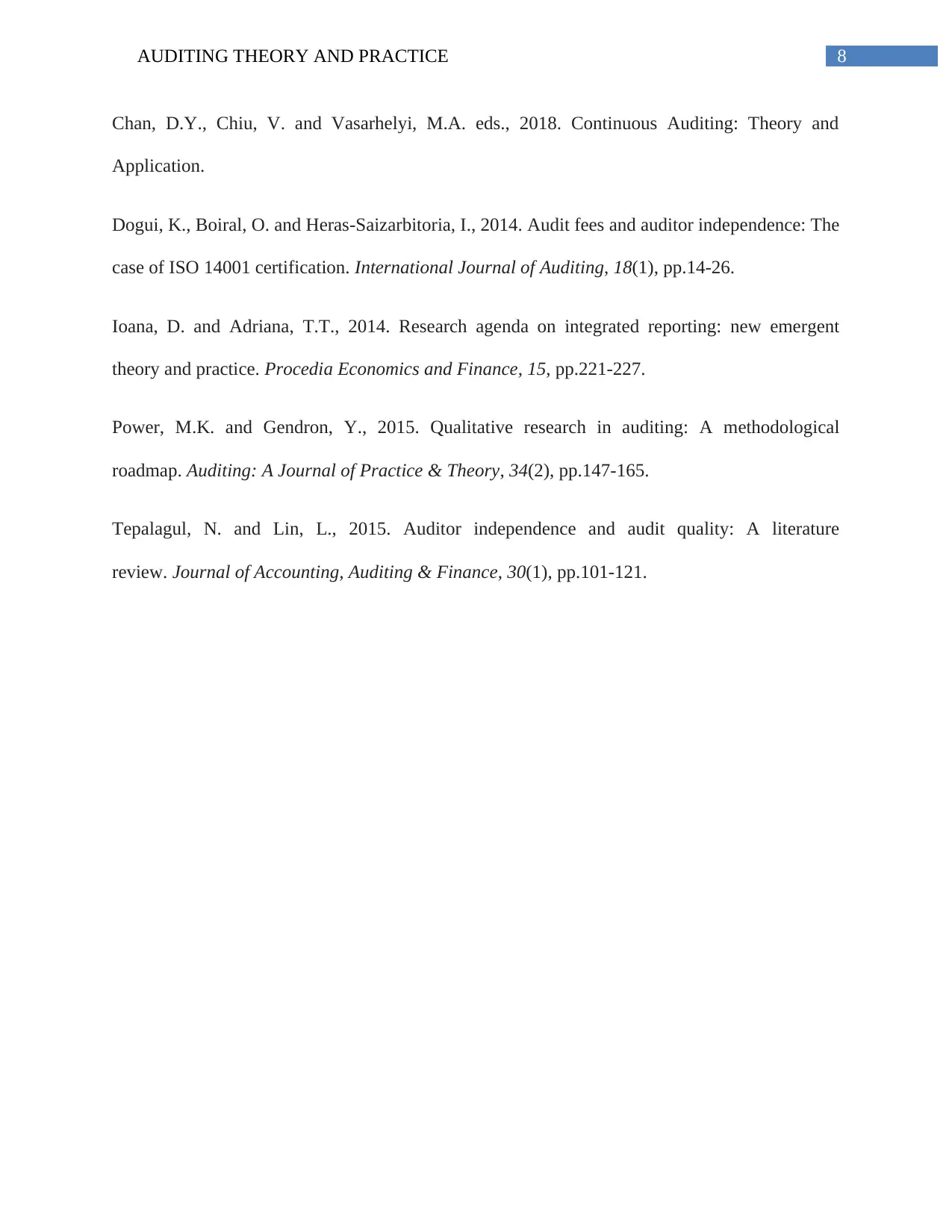
8AUDITING THEORY AND PRACTICE
Chan, D.Y., Chiu, V. and Vasarhelyi, M.A. eds., 2018. Continuous Auditing: Theory and
Application.
Dogui, K., Boiral, O. and Heras‐Saizarbitoria, I., 2014. Audit fees and auditor independence: The
case of ISO 14001 certification. International Journal of Auditing, 18(1), pp.14-26.
Ioana, D. and Adriana, T.T., 2014. Research agenda on integrated reporting: new emergent
theory and practice. Procedia Economics and Finance, 15, pp.221-227.
Power, M.K. and Gendron, Y., 2015. Qualitative research in auditing: A methodological
roadmap. Auditing: A Journal of Practice & Theory, 34(2), pp.147-165.
Tepalagul, N. and Lin, L., 2015. Auditor independence and audit quality: A literature
review. Journal of Accounting, Auditing & Finance, 30(1), pp.101-121.
Chan, D.Y., Chiu, V. and Vasarhelyi, M.A. eds., 2018. Continuous Auditing: Theory and
Application.
Dogui, K., Boiral, O. and Heras‐Saizarbitoria, I., 2014. Audit fees and auditor independence: The
case of ISO 14001 certification. International Journal of Auditing, 18(1), pp.14-26.
Ioana, D. and Adriana, T.T., 2014. Research agenda on integrated reporting: new emergent
theory and practice. Procedia Economics and Finance, 15, pp.221-227.
Power, M.K. and Gendron, Y., 2015. Qualitative research in auditing: A methodological
roadmap. Auditing: A Journal of Practice & Theory, 34(2), pp.147-165.
Tepalagul, N. and Lin, L., 2015. Auditor independence and audit quality: A literature
review. Journal of Accounting, Auditing & Finance, 30(1), pp.101-121.
⊘ This is a preview!⊘
Do you want full access?
Subscribe today to unlock all pages.

Trusted by 1+ million students worldwide
1 out of 9
Related Documents
Your All-in-One AI-Powered Toolkit for Academic Success.
+13062052269
info@desklib.com
Available 24*7 on WhatsApp / Email
![[object Object]](/_next/static/media/star-bottom.7253800d.svg)
Unlock your academic potential
Copyright © 2020–2026 A2Z Services. All Rights Reserved. Developed and managed by ZUCOL.





